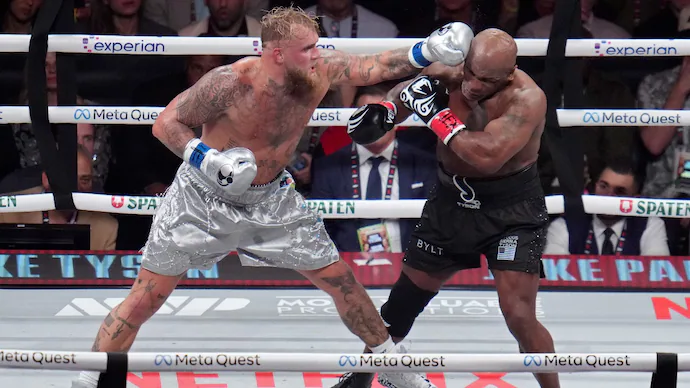
Jake Paul Wins Against Mike Tyson in Netflix Boxing Showdown
Jake Paul stunned the boxing world by defeating 57-year-old legend Mike Tyson at Netflix’s live boxing event. The matchup raised eyebrows with a remarkable 30-year age gap between the 27-year-old Paul and his opponent.
Paul added another notable win to his unconventional boxing career through this Netflix stunt match. Millions watched Netflix’s first live combat sports broadcast that showed Paul’s speed and precision against Tyson’s legendary power. The unique spectacle showed Paul’s progress in the sport and marked a most important milestone in digital sports entertainment.
Historic Netflix Boxing Debut
Netflix made history when it broadcast its first live boxing event in partnership with Most Valuable Promotions. This landmark boxing event showed a big change from traditional boxing’s pay-per-view model. The streaming giant made the Paul-Tyson bout available to its 282.7 million subscribers worldwide.
First-ever live combat sports stream
Netflix turned AT&T Stadium in Arlington, Texas, into a boxing arena. This was the company’s biggest live sports event yet. The company released “Countdown: Paul vs. Tyson,” a three-episode docuseries that showed both fighters’ experiences. The broadcast had no commercial breaks. Instead, it used themed segments and displayed sponsor logos throughout the venue.
Platform performance and viewer numbers
The historic broadcast faced major technical hurdles as viewer numbers tested Netflix’s streaming capabilities. The event produced these key results:
- YouTube saw over 750,000 concurrent viewers during preliminary fights
- Gate receipts reached a record $65.36 million
- Viewers reported thousands of outages worldwide during peak viewing times
Impact on sports broadcasting landscape
This event shows Netflix’s strategic growth in sports content delivery after successful shows like “The Netflix Cup” and “The Netflix Slam.” The platform chose an “event model” instead of traditional season-long sports coverage. Industry experts see this as a game-changer for boxing and fighting broadcasts. Netflix’s huge subscriber base makes major sporting events available to more people than ever before.
Netflix has already secured deals for NFL Christmas Day games and WWE content. This success altered the map of sports broadcasting. Streaming platforms now compete directly with traditional networks for major sporting events, which marks the start of a new era.
Fight Night Breakdown
The eight-round heavyweight bout turned into a showcase of youth versus experience. Paul’s superior conditioning ended up making the difference.
Round-by-round analysis
Tyson started strong by showing flashes of his legendary power. He charged forward in Round 1 and landed a powerful overhand right. The momentum took a dramatic turn in Round 3 when Paul rocked Tyson with a short right. Paul followed up with precise combinations that showed his superior speed and stamina. Tyson slowed down noticeably by Round 6, while Paul managed to keep consistent pressure through calculated jabs and body shots. Both fighters showed mutual respect in the final round, with Paul bowing to Tyson as the fight drew to a close.
Key statistical highlights
The numbers explain Paul’s dominance throughout the contest:
| Statistic | Jake Paul | Mike Tyson |
|---|---|---|
| Punches Thrown | 278 | 97 |
| Punches Landed | 78 | 18 |
| Connection Rate | 28% | 19% |
Decisive moments and scoring
The judges’ scorecards confirmed Paul’s command of the bout with clear victory margins:
- Judge 1: 80-72 (Paul)
- Judge 2: 79-73 (Paul)
- Judge 3: 79-73 (Paul)
The third round proved especially decisive. Paul’s combination of right hooks and precise body shots affected Tyson’s movement. Tyson showed remarkable toughness and absorbed heavy punishment without going down. His offensive output dropped substantially after the fourth round. Paul’s strategic approach worked well. He kept his distance while picking his shots and neutralized Tyson’s legendary power. This led to a controlled performance that focused on technique rather than spectacle.
Age vs Experience Dynamic
The historic matchup between Mike Tyson and Jake Paul showcased one of boxing’s most dramatic age gaps. Their bout turned into a captivating study of contrasting advantages.
Tyson’s veteran expertise
Tyson stepped into the ring with 110 total fights compared to Paul’s mere 10, bringing unmatched experience. The former heavyweight champion’s technical mastery showed in his early round performance. His legendary muscle memory and timing were on display. He could still read opponents and counter-punch effectively, though age had taken its toll.
Paul’s youth advantage
The 31-year age gap turned out to be the deciding factor as Paul showed better conditioning throughout. Paul, at 27, gained a crucial edge in stamina and agility through modern training methods and recovery protocols. His youth became more evident as the fight went on. He managed to keep consistent movement and punch output while Tyson tired visibly.
Impact on fight strategy
The age difference shaped both fighters’ tactical approaches fundamentally. Paul executed a smart game plan that played to his strengths:
- He kept his distance with better footwork
- He threw quick combinations to wear down Tyson
- He used ring space to make Tyson burn energy
The match needed modified rules because of the age gap:
| Modification | Standard Boxing | Paul vs Tyson |
|---|---|---|
| Round Length | 3 minutes | 2 minutes |
| Glove Weight | 10 oz | 14 oz |
| Total Rounds | 10-12 | 8 |
These changes were essential for safety and highlighted the physical differences between both fighters. Tyson’s legendary power flashed briefly, but Paul’s higher work rate throughout the shortened rounds helped him secure the victory.
Technical Fight Analysis
The Texas Department of Licensing and Regulation approved this unusual matchup. They added several technical changes to keep fighters safe without compromising the competition’s quality.
Modified rules and regulations
The fight looked quite different from regular boxing standards. Both competitors needed specific adjustments to compete. Officials required 14-ounce gloves instead of standard 10-ounce ones to reduce the power of punches. The match lasted eight two-minute rounds rather than regular three-minute ones. This meant the fighters would box for a maximum of 16 minutes.
| Aspect | Standard Boxing | Paul vs Tyson Fight |
|---|---|---|
| Round Duration | 3 minutes | 2 minutes |
| Total Rounds | 10-12 | 8 |
| Glove Weight | 10 oz | 14 oz |
| Scoring System | 10-point must | 10-point must |
Fighting styles comparison
Paul showed a modern approach backed by analytics. He used his reach advantage and better movement effectively. His style focused on controlled aggression. He kept his distance and threw precise combinations. Tyson worked within the modified rules and still managed to show glimpses of his famous peek-a-boo defense. His explosive inside fighting stood out in the early rounds.
Strategic approaches
Paul won the fight by focusing on three main things:
- He moved his feet to keep the right distance
- He threw combinations when Tyson was off balance
- He took advantage of openings as Tyson tired in later rounds
Netflix’s streaming platform struggled with the broadcast. More than 80,000 users reported problems during the event. The fight continued as planned despite these issues. Three official judges scored each round using the traditional 10-point must system. A knockdown would result in a 10-8 round, though neither fighter hit the canvas.
This sanctioned bout meant the result would count on both fighters’ records. Many people first saw it as just an exhibition match. The technical rules and modifications created something special. It balanced entertainment with real athletic competition.
Jake Paul’s victory over Mike Tyson marks a defining moment between traditional boxing and modern sports entertainment. Paul showed better conditioning and tactical skills. Tyson’s brief flashes of legendary power reminded viewers of his lasting effect on boxing. Netflix made a successful move into live sports broadcasting. The platform reached millions of viewers worldwide despite technical issues and created a new way to present boxing matches.
Numbers backed the outcome clearly. Paul connected with 78 punches while Tyson landed just 18. The modified rules and safety measures helped create a competitive yet responsible match. The 31-year gap between fighters highlighted how boxing has changed. Paul’s modern training methods and youth advantages worked better than Tyson’s rich experience.
This groundbreaking event altered the map of sports broadcasting and created new chances for streaming platforms in live sports entertainment. Paul added another chapter to his unique boxing career. Netflix’s success with live sports points to more high-profile events coming soon to streaming platforms.






